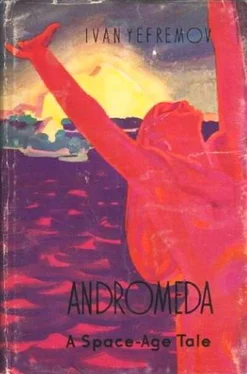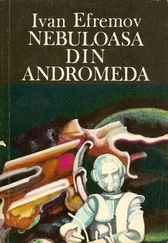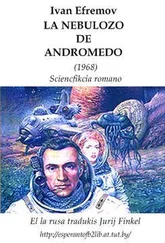Ivan Yefremov - Andromeda (A Space-Age Tale)
Здесь есть возможность читать онлайн «Ivan Yefremov - Andromeda (A Space-Age Tale)» весь текст электронной книги совершенно бесплатно (целиком полную версию без сокращений). В некоторых случаях можно слушать аудио, скачать через торрент в формате fb2 и присутствует краткое содержание. Город: Moscow, Год выпуска: 1959, Издательство: FOREIGN LANGUAGES PUBLISHING HOUSE, Жанр: Фантастика и фэнтези, на английском языке. Описание произведения, (предисловие) а так же отзывы посетителей доступны на портале библиотеки ЛибКат.
- Название:Andromeda (A Space-Age Tale)
- Автор:
- Издательство:FOREIGN LANGUAGES PUBLISHING HOUSE
- Жанр:
- Год:1959
- Город:Moscow
- ISBN:нет данных
- Рейтинг книги:5 / 5. Голосов: 1
-
Избранное:Добавить в избранное
- Отзывы:
-
Ваша оценка:
- 100
- 1
- 2
- 3
- 4
- 5
Andromeda (A Space-Age Tale): краткое содержание, описание и аннотация
Предлагаем к чтению аннотацию, описание, краткое содержание или предисловие (зависит от того, что написал сам автор книги «Andromeda (A Space-Age Tale)»). Если вы не нашли необходимую информацию о книге — напишите в комментариях, мы постараемся отыскать её.
Andromeda (A Space-Age Tale) — читать онлайн бесплатно полную книгу (весь текст) целиком
Ниже представлен текст книги, разбитый по страницам. Система сохранения места последней прочитанной страницы, позволяет с удобством читать онлайн бесплатно книгу «Andromeda (A Space-Age Tale)», без необходимости каждый раз заново искать на чём Вы остановились. Поставьте закладку, и сможете в любой момент перейти на страницу, на которой закончили чтение.
Интервал:
Закладка:
“We can live here,” said the biologist, smiling feebly as lie reported the station’s findings to the commander.
“If we can live on that gloomy, heavy planet, then something is probably living there already, something small and harmful.”
For the spaceship’s fifteenth revolution a bomb beacon with a powerful transmitter was prepared. This second physical research station, dropped on the night side when the planet had rotated through 120°, disappeared without sending out any signals.
“It has fallen into the ocean,” said geologist Beena Ledd, biting her lips in annoyance.
“We must feel our way with the main locator before we put out a TV robot. We’ve only got two of them.”
Tantra emitted a bunch of directed radio waves as she revolved round the planet, feeling for the contours of seas and continents that owing to distortion were unclear. They found the outlines of a huge plain that thrust out into the ocean, or divided two oceans, almost on the planet’s equator. The spaceship’s ray zigzagged across a strip of land two hundred kilometres wide. Suddenly a bright point flared up on the locator screen. A whistle that lashed their strained nerves told them that it was no hallucination.
“Metal!” exclaimed the geologist, “an open deposit.” Erg Noor shook his head.
“Although the flash did not last long I managed to note its regular outline. That was a huge piece of metal, a meteorite or….”
“A ship!” exclaimed Nisa and the biologist together. “Fantasy!” snapped Pour Hyss.
“It may be fact,” objected Erg Noor. “What does it matter, it’s no use arguing,” said Pour Hyss, unwilling to give in. “There’s no way of proving it, we’re not going to land, are we?”
“We’ll check up on it in three hours’ time when we reach that plain again. Notice that the metal object is on the plain that I, too, would have chosen to land on. We’ll throw out the TV robot at that very spot. Tune the locator ray to a six-second warning!”
The commander’s plan was successful and Tantra made another three-hour flight round the dark planet. The next time the ship approached the continental plain it was met by TV broadcasts from the robot. The people peered into the light screen. With a click the visible ray was switched on and peered like a human eye, noting the outlines of things far down below, in that thousand-kilometre-deep black abyss. Kay Bear could well imagine the head of the robot station sticking out of the armour plate and revolving like a lighthouse. The zone that was swept by the instrument’s eye appeared on the screen and was there and then photographed: the view consisted of low cliffs, hills and the winding black lines of watercourses. Suddenly the vision of a gleaming, fish-shaped object crossed the screen and again melted into the darkness as it was abandoned by the light ray to the darkness and the ledges of the plateau.
“A spaceship!” gasped several voices in unison. Nisa looked at Pour Hyss with undisguised triumph. The screen went dark as Tantra left the area of the TV robot’s activity and Eon Thal immediately set about developing the film of the electronic photographs. With fingers that trembled with impatience he placed the film in the projector of the hemispherical screen that would give them stereoscopic pictures of what had been photographed. The inner walls of the hollow hemisphere gave them an enlarged picture.
The familiar cigar-shaped outlines of the ship’s hows, the bulge of the stern, the high ridge of the equilibrium receiver…. No matter how unbelievable it all was, no matter how utterly impossible they might regard a meeting here, on the dark planet, the robot could not invent anything, a terrestrial spaceship lay there! It lay horizontally, in the normal landing position, supported by its powerful landing struts, undamaged, as though it had only just alighted on to the planet of the iron star.
Tantra, revolving in a shorter orbit closer to the planet, sent out signals that were not answered. A few more hours passed. The fourteen members of the expedition again gathered in the control tower. Erg Noor, who had been sitting in deep contemplation, stood up.
“I propose to land Tantra. Perhaps our brothers are in need of help, perhaps their ship is damaged and cannot return to Earth. If so we can take them, transfer their anameson and save ourselves. There is no sense in sending out a rescue rocket. It cannot do anything to give us fuel and will use up so much energy that there will not be enough left to send a signal to Earth.”
“Suppose the ship is here because of a shortage of anameson?” asked Pel Lynn, cautiously.
“Then it should have ion planetary charges, they could not have used up everything. As you see the spaceship is in its proper position which means they landed with the planetary motors. We’ll transfer the ion fuel, take off again and go into orbit; then we can call Earth for help and in case of success that won’t take more than eight years. And if we can get anameson, then we shall have won out.” “Maybe they have photon and not ion charges for their planetary motors,” said one of the engineers.
“We can make use of them in the big motors if we fit them with auxiliary bowl reflectors.”
“I see you’ve thought of everything.,” said the engineer, giving in.
“There is still the risk of landing on a heavy planet and the risk of living there,” muttered Pour Hyss. “It’s awful just to think of that world of darkness!”
“The risk, of course, remains. But there is risk in our very situation and we shall hardly increase it by landing. The planet on which our spaceship will land is not a bad one as long as we do not damage the ship.”
Erg Noor cast a glance at the dial of the speed regulator and walked swiftly to the control desk. For a whole minute he stood in front of the levers and vernier scales of the controls. The fingers of his big hands moved as though they were selecting chords on some musical instrument, his back was bent and his face turned to stone.
Nisa Creet went up to him, boldly took his right hand and pressed the palm to her smooth cheek, hot from excitement. Erg Noor nodded in gratitude, stroked the girl’s mass of hair and straightened himself up.
“We are entering the lower layers of the atmosphere to land,” he said loudly, switching on the warning siren. The howl carried throughout the ship and the crew hurried to strap themselves into hydraulic floating scats.
Erg Noor dropped into the soft embrace of the landing chair that rose up from the floor before the control desk. Then came the heavy strokes of the planetary engines and the spaceship rushed down, howling, towards the cliffs and oceans of the unknown planet.
The locators and the infrared reflectors felt their way through the primordial darkness below, red lights glowed on the altimeter scales at 15,000 metres. It was not anticipated that there would be mountains much over 10,000 metres high on the planet where water and the heat of the black sun had been working to level out the surface as was the case on Earth.
The first revolution round the planet revealed no mountains, only insignificant heights, little bigger than those of Mars. It looked as though the activity of the internal forces that gave rise to mountains had ceased or had been checked.
Erg Noor placed the altitude governor at 2,000 metres and switched on the powerful searchlights. A huge ocean stretched below the spaceship, an ocean of horror, an unbroken mass of black waves that rose and fell over unfathomable depths.
The biologist wiped away the perspiration caused by his strenuous efforts; he was trying to catch in his instrument the faint variations in reflection from the black water to determine its salt and mineral content.
Читать дальшеИнтервал:
Закладка:
Похожие книги на «Andromeda (A Space-Age Tale)»
Представляем Вашему вниманию похожие книги на «Andromeda (A Space-Age Tale)» списком для выбора. Мы отобрали схожую по названию и смыслу литературу в надежде предоставить читателям больше вариантов отыскать новые, интересные, ещё непрочитанные произведения.
Обсуждение, отзывы о книге «Andromeda (A Space-Age Tale)» и просто собственные мнения читателей. Оставьте ваши комментарии, напишите, что Вы думаете о произведении, его смысле или главных героях. Укажите что конкретно понравилось, а что нет, и почему Вы так считаете.











